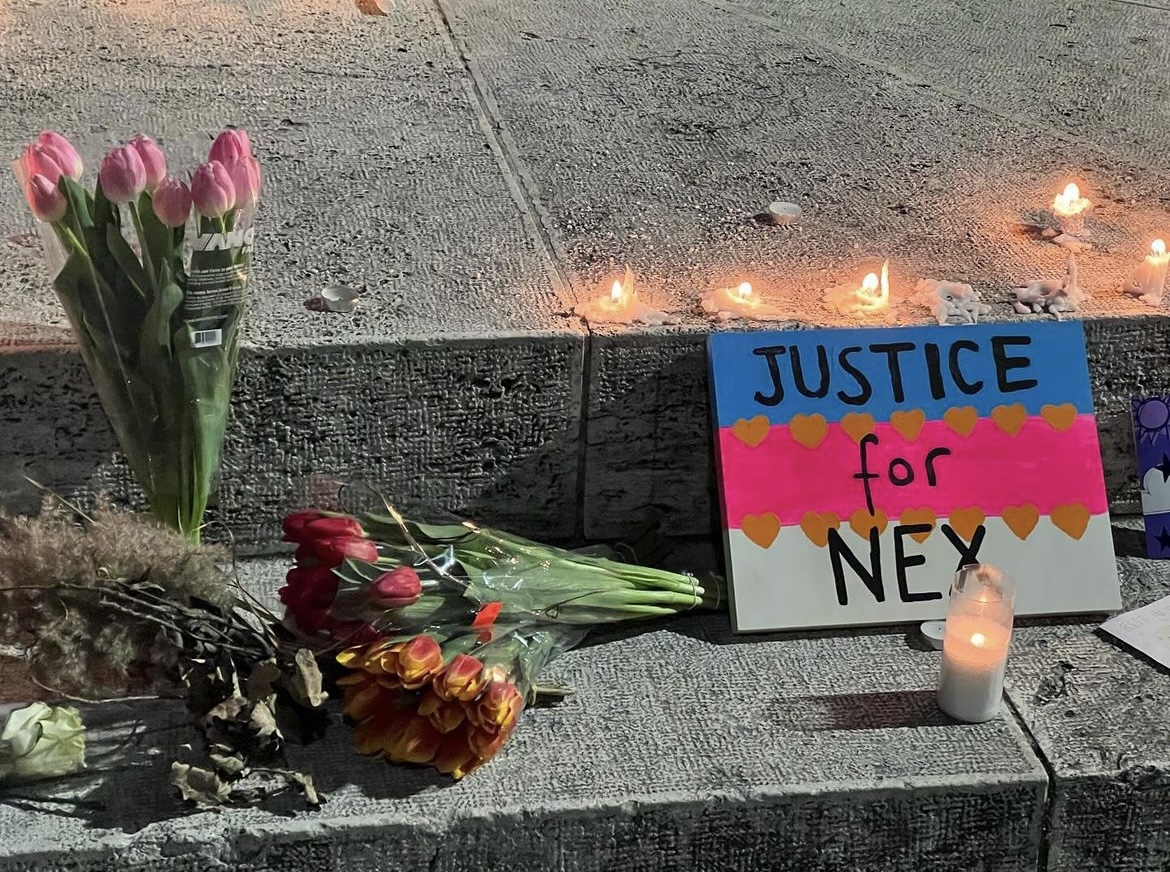After the 16-year-old died following an attack at school, the Montreal community gathered to grieve and advocate for the protection of trans youth.
Trigger warning: transphobia, transicide.
“I have a question for Nex’s killers: how many more do you want to take? […] When will you stop treating trans lives as disposable? When will you stop treating Indigenous and Two-Spirit lives as disposable?” Trans-activist Celeste Trianon proclaimed to the crowd, “You’ve already got so much blood on your hands; they can’t get any redder.”
On March 1, over 100 people gathered in Montreal’s Cabot Square to commemorate the death of 16-year-old Nex Benedict, an Indigenous non-binary youth from Oklahoma.
One month ago, on Feb. 7, Benedict was attacked and beaten by three girls in the washroom of Owasso High School in Oklahoma. On the day of the attack, Benedict was taken to the hospital by their mom, Sue Benedict, and sent home after assessment. The following day, they collapsed at home and were rushed to the hospital, where they were pronounced dead.
After a thorough investigation, the police ruled Benedict’s death as a suicide on March 13.
A number of vigils memorializing their passing have been held across Canada and the United States. Montreal’s vigil was organized by Atreyu Lewis and Rising from Our Roots, an anti-oppression community organization that provides funds and resources.
Despite the incident taking place outside of Canada, organizers of the event made it clear that Benedict’s death has an impact on Indigenous and queer communities worldwide. “I think it’s really important because we want to establish transnational solidarity with what is happening in the U.S.,” Lewis said.
“I think a lot of trans LGBTQ+ people in Canada really want to […] have that tangible action. Especially since it can be hard to do it on the ground [in the U.S.] because of all of the policies.”
On social media, they emphasized the vigil aimed to hold space for BIPOC LGBTQ+ people in Montreal as well as to commemorate and grieve the death of their non-binary Chahta peer.
Attendees were encouraged to bring candles, lights, flowers, and sacred items. The vigil included a smudging ceremony; an Indigenous practice in which herbs and resins are burned to purify the mind, body, and spirit.
Since Benedict’s death became public, school officials in the district have faced extreme backlash. Oklahoma’s superintendent for public schools, Ryan Walter, has been adamant in his anti-transgender stance since being appointed to his role in 2022. Later that year, Oklahoma became the first state in the U.S. to prohibit the use of non-binary gender markers on birth certificates.
The U.S. Department of Education has launched a federal investigation into the Oklahoma school district after the Human Rights Campaign filed a complaint.
Benedict’s loved ones reported that Benedict had been experiencing bullying for more than a year leading up to the incident. Their death has renewed the fight against the growing number of anti-trans bills in the U.S., which many queer advocates say played a vital hand in the teen’s death.
Lewis explained that attending protests, advocating for trans rights in policy, and ensuring spaces are accessible and diverse are ways to help protect trans-BIPOC folks. “Learn about the trans and queer people in your life and show up to support them,” they said. Lewis also mentioned Project 10 Montreal, which is a nonprofit community organization that supports 2SLGBTQIA+ youth.
